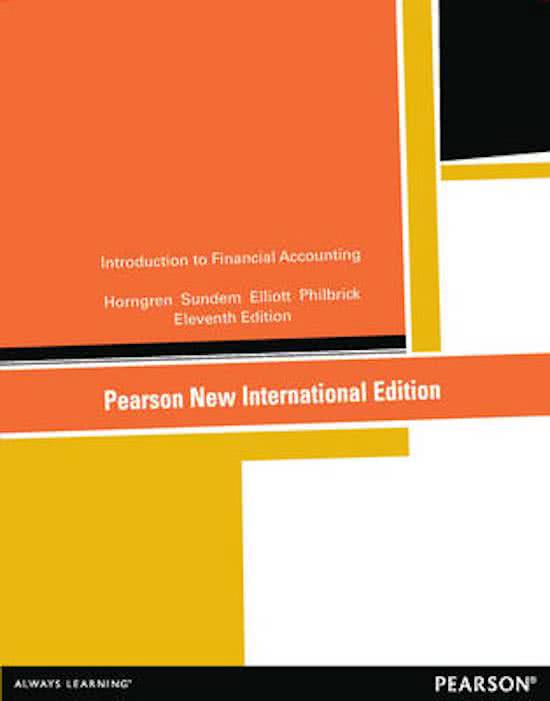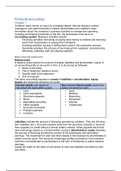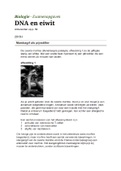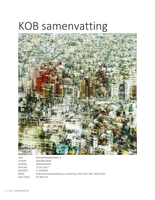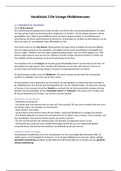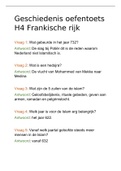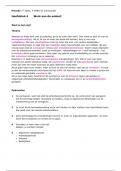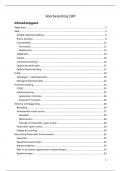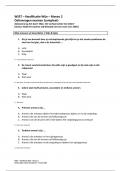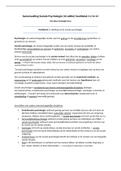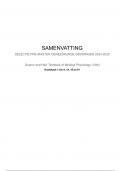Financial accounting
Chapter 1
Creditors make money on loans by charging interest. Internal decision makers
(managers) and external decision makers (stockholders and creditors) need
information about the company’s business activities to manage the operating,
investing and financing activities of the firm. All businesses must have an
accounting system. Business activities include:
- Financing activities: borrowing or paying back money to lenders and receiving
funds from stockholders or paying them dividends
- Investing activities: buying or selling items used in the production process
- Operating activities: the process of purchasing from suppliers, manufacturing,
delivering, collecting cash and paying suppliers.
Basic financial statements
Balance sheet
A balance sheet reports the amount of assets, liabilities and stockholders’ equity of
an accounting entity at one point in time. It is structured as followed:
1. Name of the entity
2. Title of statement (balance sheet)
3. Specific date of the statement
4. Unit of measure
The basic accounting equation is assets = liabilities + stockholders’ equity
Assets are resources owned by the entity
Current assets (can easily be Non-current (fixed) assets (cannot be
converted into cash within a year) easily converted to cash)
1. Cash Land
2. Cash equivalents Building
3. Short-term deposits Machinery
4. Stock Equipment
5. Marketable securities Patents
6. Office supplies Trademarks
7. Accounts receivable
8. Prepaid expenses
9. inventory
Liabilities indicate the amount of financing provided by creditors. They are the long-
term liabilities don’t. Accounts payable arise from the purchase of goods or services
from suppliers on credit without a formal written contract. Notes payable result from
cash borrowings based on a formal written contract. Stockholders’ equity indicates
the amount of financing provided by owners of the businesses and reinvested
earnings. The investment of cash and other assets in the business by stockholders is
called common stock. The amounts of earnings (profits) reinvested in the business
(and thus not distributed to stockholders in the form of dividends) is called retained
earnings.
Assets are listed by the ease of conversion to cash and liabilities are listed by their
due dates
, The income statement
The income statement reports the accountant’s primary measure of performance of
a business, revenues less expenses during the accounting period.
Revenues – expenses = net income
Companies earn revenues from the amounts expected to be received for goods or
services that have been delivered to a customer, whether or not the customer has
paid for the goods or services. Expenses represent the amount of resources the
entity used to earn revenues during the period. Net income or net earnings is the
excess of total revenues over expenses.
Statement of stockholders’ equity
The statement of stockholders’ equity reports the way that net income and the
distribution of dividends affected the financial position of the company during the
accounting period. For example:
Beginning retained earnings + net income – dividends = ending retained earnings
The statement starts with the beginning balances in de SE accounts, lists the
increases and decreases, and reports the resulting ending balances.
Statement of cash flows
Statement of cash flows reports inflows and outflows of cash during the accounting
period in the categories of operating, investing and financing.
+/- cash flows from operating activities (CFO)
+/- cash flows from investing activities (CFI)
+/- cash flows from financing activities (CFF)
Change in cash
+ beginning cash balance
Ending cash balance
Cash flows from operating activities are cash flows that are directly related to
earning income. Cash flows from investing activities include those related to the
acquisition or sale of the company’s plant and equipment and investments. Cash
flows from financing activities are related to the financing of the enterprise itself.
They involve the receipt or payment of money to investors and creditors.
Relations between the statements
1. Net income from the income statement results in an increase in ending retained
earnings on the statement of stockholders’ equity.
2. Ending retained earnings from the statement of stockholders’ equity is one of the
two components of stockholders’ equity on the balance sheet.
3. The change in cash on the cash flow statement added to the beginning-of-the-
year balance in cash equals the end-of-the-year balance in cash on the balance
sheet.
Responsibilities for the accounting communication process
The rules that determine the content and measurement rules of the statements are
called general accepted accounting principles, or GAAP. Companies should take
three steps to assure investors that the company’s records are accurate: (1) they
should maintain a system of controls over both the records and the assets of the
Chapter 1
Creditors make money on loans by charging interest. Internal decision makers
(managers) and external decision makers (stockholders and creditors) need
information about the company’s business activities to manage the operating,
investing and financing activities of the firm. All businesses must have an
accounting system. Business activities include:
- Financing activities: borrowing or paying back money to lenders and receiving
funds from stockholders or paying them dividends
- Investing activities: buying or selling items used in the production process
- Operating activities: the process of purchasing from suppliers, manufacturing,
delivering, collecting cash and paying suppliers.
Basic financial statements
Balance sheet
A balance sheet reports the amount of assets, liabilities and stockholders’ equity of
an accounting entity at one point in time. It is structured as followed:
1. Name of the entity
2. Title of statement (balance sheet)
3. Specific date of the statement
4. Unit of measure
The basic accounting equation is assets = liabilities + stockholders’ equity
Assets are resources owned by the entity
Current assets (can easily be Non-current (fixed) assets (cannot be
converted into cash within a year) easily converted to cash)
1. Cash Land
2. Cash equivalents Building
3. Short-term deposits Machinery
4. Stock Equipment
5. Marketable securities Patents
6. Office supplies Trademarks
7. Accounts receivable
8. Prepaid expenses
9. inventory
Liabilities indicate the amount of financing provided by creditors. They are the long-
term liabilities don’t. Accounts payable arise from the purchase of goods or services
from suppliers on credit without a formal written contract. Notes payable result from
cash borrowings based on a formal written contract. Stockholders’ equity indicates
the amount of financing provided by owners of the businesses and reinvested
earnings. The investment of cash and other assets in the business by stockholders is
called common stock. The amounts of earnings (profits) reinvested in the business
(and thus not distributed to stockholders in the form of dividends) is called retained
earnings.
Assets are listed by the ease of conversion to cash and liabilities are listed by their
due dates
, The income statement
The income statement reports the accountant’s primary measure of performance of
a business, revenues less expenses during the accounting period.
Revenues – expenses = net income
Companies earn revenues from the amounts expected to be received for goods or
services that have been delivered to a customer, whether or not the customer has
paid for the goods or services. Expenses represent the amount of resources the
entity used to earn revenues during the period. Net income or net earnings is the
excess of total revenues over expenses.
Statement of stockholders’ equity
The statement of stockholders’ equity reports the way that net income and the
distribution of dividends affected the financial position of the company during the
accounting period. For example:
Beginning retained earnings + net income – dividends = ending retained earnings
The statement starts with the beginning balances in de SE accounts, lists the
increases and decreases, and reports the resulting ending balances.
Statement of cash flows
Statement of cash flows reports inflows and outflows of cash during the accounting
period in the categories of operating, investing and financing.
+/- cash flows from operating activities (CFO)
+/- cash flows from investing activities (CFI)
+/- cash flows from financing activities (CFF)
Change in cash
+ beginning cash balance
Ending cash balance
Cash flows from operating activities are cash flows that are directly related to
earning income. Cash flows from investing activities include those related to the
acquisition or sale of the company’s plant and equipment and investments. Cash
flows from financing activities are related to the financing of the enterprise itself.
They involve the receipt or payment of money to investors and creditors.
Relations between the statements
1. Net income from the income statement results in an increase in ending retained
earnings on the statement of stockholders’ equity.
2. Ending retained earnings from the statement of stockholders’ equity is one of the
two components of stockholders’ equity on the balance sheet.
3. The change in cash on the cash flow statement added to the beginning-of-the-
year balance in cash equals the end-of-the-year balance in cash on the balance
sheet.
Responsibilities for the accounting communication process
The rules that determine the content and measurement rules of the statements are
called general accepted accounting principles, or GAAP. Companies should take
three steps to assure investors that the company’s records are accurate: (1) they
should maintain a system of controls over both the records and the assets of the


